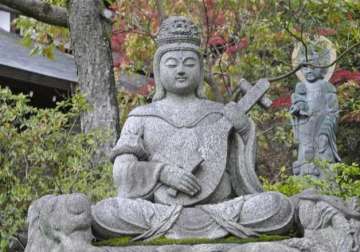New Delhi: The fact that reach of Indian culture is well beyond Indian subcontinent is a common knowledge, but the roots of Hinduism, like Buddhism, are also connected to the land of rising sun came as a surprise.
Over 20 Hindu deities are very actively worshipped in Japan. The country has hundreds of shrines singularly dedicated to Goddess Saraswati, along with innumerable representations of Lakshmi, Indra, Brahma, Ganesha, Garuda,Kubera and others, Even deities long forgotten in India such as Vayu and Varuna are still worshiped in Japan.
A unique exhibition at Kolkata's Indian Museum is being organised by Japan Foundation in collaboration with filmmaker and art-historian Benoy K Behl to throw light on the country's long lost history that survives in a foreign land.
Behl, who began his career as a photographer, has made 130 documentary films in the past and his exhibition will reveal startling facts about the importance of Indian heritage in Japan. The exhibition will also explain how India's relationship with Japan.
Very many words in the Japanese language are from Sanskrit. In the supermarkets, a major brand of milk products is called ‘Sujata'. The company personnel are taught the story of Sujata who gave sweet rice milk to the Buddha, with which he broke his period of austerity, before he gained Enlightenment.
For instance, the 6th century Siddham script is preserved in Japan, though it has disappeared from India. 'Beejaksharas' (or etymology of alphabets) of Sanskrit in this script are regarded as holy and given great importance. Each deity has a 'Beejakshara' and these are venerated by the people, even though most of them cannot read it. Some Japanese tombs are adorned with the Sanskrit alphabet.
Apart from the language, there are deeper civilization connections that can be traced to early developments of philosophy in India.
Behl wrote in his research, "In many ways, this philosophic understanding is most well preserved in Japan. Japan has not had the breakdown of cultural norms which India suffered when a colonial education system was created. Therefore, most Indians learnt about our own culture from the Western point of view. The dominant and admired language was English, which it remains till today."
“Our relationship with Japan is far closer than Indians seem to be aware of. It is time to understand this and to build upon it, Behl notes.
"The deep-rooted spirit of the Buddha's teachings energizes the Japanese people. Buddhist temples are numerous and vast numbers of people visit these every day. Besides the Buddha, many ancient Indian deities and practices (prevail) in their temples. An Indian feels quite at home in Japan," Behl wrote.
“Japan is the one country where Buddhism is flourishing in all its facets. Here, technology and transcendence are living together. The deep-rooted spirit of Buddha's teachings energies the Japanese people, he added.
Latest India News

